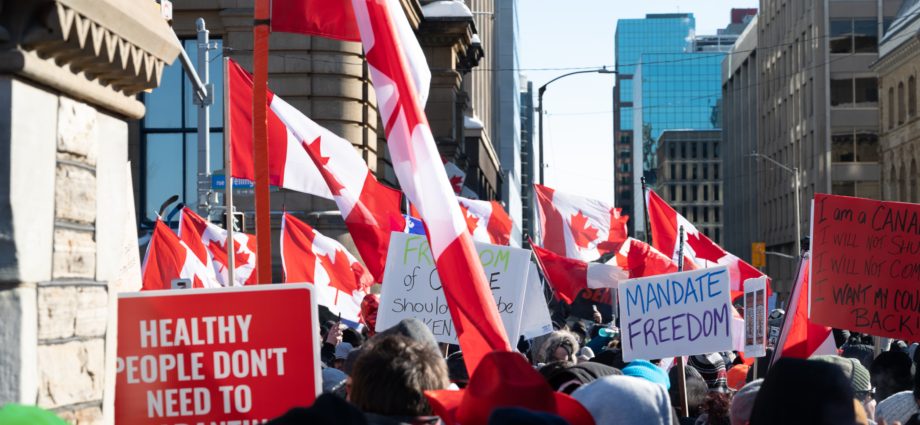
Clifton van der Linden, McMaster University and Alexander G W Beyer, Simon Fraser University
February 3, 2022
The arrival of the self-styled “freedom convoy” in Ottawa this week has dominated headlines, but do the demonstrators represent the views of most Canadians? When it comes to their stark opposition to government-imposed restrictions and vaccine mandates, research shows the protesters clearly represent a minority view — no matter how vocal they are.
Most Canadians support government measures to help control the spread of COVID-19, according to our ongoing public opinion study. Known as the COVID-19 Monitor, the study of Canadians’ attitudes relating to the COVID-19 pandemic and public policy interventions has been running since shortly after the first COVID-19-related government restrictions were introduced in March 2020. It has amassed more than 100,000 respondents, making it one of the largest continuing studies of Canadian attitudes toward the pandemic.
The study is a partnership between McMaster University’s Digital Society Lab and Vox Pop Labs, a social enterprise that conducts public opinion research polling. We hold positions with both organizations.
Our findings indicate that a majority of Canadians support most of the measures that have been employed by federal and provincial governments aimed at preventing the transmission of COVID-19. In most cases support has remained relatively stable since the beginning of the pandemic.

Our objective in reporting the results of this study is not to pass judgement on the views of the “freedom convoy” demonstrators or their supporters. We simply offer a series of empirical tests of the claims that those views are widely shared among Canadians. Our analysis of the data from the COVID-19 Monitor indicates that such claims are significantly exaggerated.
The most recent wave of the COVID-19 Monitor study was conducted online from Jan. 4-10, 2022, and completed by 2,339 respondents randomly selected from the Vox Pop Labs online respondent panel. The respondents were weighted by census estimates of age, education, region, sex and vote choice in the 2021 federal election to reflect a representative sample of the Canadian population.
Vaccine mandates
Although they are widely attributed as the catalyst for the trucker rally, vaccine mandates actually enjoy high levels of support among Canadians. Survey data shows approximately four out of five Canadians agree that health- and long-term care workers should be required to be vaccinated against COVID-19. Roughly three-quarters of Canadians think that vaccines should be mandatory for government workers and politicians.
There is even broad-based support for a vaccine mandate for all non-exempt adults over the age of 18, with 70 per cent of Canadians indicating that they back the measure to some extent. That support begins to decline slightly when it comes to opinions on mandatory vaccines for teenagers and adolescents. It drops precipitously to just under 50 per cent for children under the age of five.

Vaccine passports
A majority of Canadians agree with the requirement to provide proof of vaccination against COVID-19 in order to undertake certain activities. We observed that an estimated four out of every five Canadians supports vaccine passports for air or cruise ship travel. Support tapers off ever-so-slightly for proof of vaccination in venues such as movie theatres, restaurants and gyms.
Of all the activities posed to survey respondents, shopping at a grocery store registered the lowest level of support for requiring vaccine passports. Just 50 per cent of Canadians indicated that they would agree with such a measure.

Restrictions
Canadians are also broadly supportive of most government-imposed restrictions associated with COVID-19. The field dates of this latest wave of the COVID-19 Monitor study coincide with renewed restrictions in many provinces in response to a surge in cases associated with the Omicron variant.
The highest level of support for restrictions is with respect to nursing homes, but respondents also indicated widespread agreement with restrictions on international travel, bars and nightclubs and stadiums. Even school and daycare closures received majority support with 66 per cent of Canadians strongly or somewhat agreeing with such measures given the circumstances at the time.

Only the possibility of restrictions on playgrounds, parks and the potential for curfews received less than majority support. This is a marked shift from a year ago, when our data shows that Canadians were more supportive of restrictions on outdoor activities than they are now.

Impacts
The high levels of support that Canadians express for vaccine mandates and restrictions should not be interpreted as satisfaction with present conditions. To the contrary, results from the COVID-19 Monitor study suggest that self-reported mental health among Canadians is approaching its lowest point since the pandemic began.

Moreover, approval ratings for Justin Trudeau’s handling of the pandemic — as well as those of provincial premiers including Doug Ford and François Legault — are approaching or are already at their lowest levels in the past year.

Overall, our findings suggest that Canadians are growing increasingly weary of the pandemic and its management by our political leaders, but are by and large resolved to support the measures being put in place by the federal and provincial governments to try to see us through.
Subscribe to our newsletter.
While this may not be the sense that one gets on the streets of Ottawa this week, these results reflect that it is the position of most Canadians.
Clifton van der Linden, Assistant Professor of Political Science and Digital Society Lab Director, McMaster University and Alexander G W Beyer, PhD Candidate, Political Science, Simon Fraser University
This article is republished from The Conversation under a Creative Commons license. Read the original article.



